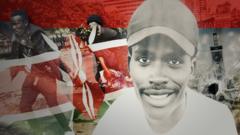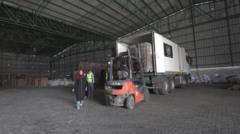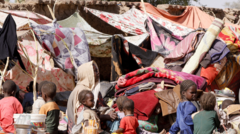As protests against Hamas intensify across Gaza, many residents are openly challenging the group's long-standing dominance. With accusations of negligence amid a humanitarian crisis, a notable shift in public sentiment suggests that the fear of retaliation is beginning to recede, despite the dangers facing dissenters.
Rising Defiance: The Growing Opposition Against Hamas in Gaza

Rising Defiance: The Growing Opposition Against Hamas in Gaza
A surge of anti-Hamas protests reveals an escalating dissatisfaction among Palestinians in Gaza as the group's grip on power weakens.
In recent weeks, Gaza has witnessed a notable increase in anti-Hamas protests, with residents resorting to vocal, open defiance against the group that has ruled the territory for nearly two decades. The escalating demonstrations, marked by chants of “All of Hamas, out!” and claims that “Hamas is garbage,” reflect a mounting dissatisfaction with the armed group's leadership, held accountable for ushering in what many describe as the worst humanitarian crisis faced by Palestinians in over 70 years.
Moumen al-Natour, a Gaza-based lawyer and former organizer of the 2019 anti-Hamas "We Want to Live" movement, vocalizes the frustration resonating among the populace. Speaking from a makeshift tent that now serves as his residence, al-Natour pointedly remarks, “The world thinks that Gaza is Hamas and Hamas is Gaza, but we did not choose Hamas.” His assertion underscores a growing sentiment of resentment among Palestinians, which is gaining momentum as the harsh conditions continue to escalate.
Despite the risks associated with dissent, including violent repercussions from Hamas, al-Natour argues for the vital need to raise voices against the group. He issued a bold statement in the Washington Post, claiming, "To support Hamas is to be for Palestinian death, not Palestinian freedom." The ongoing demonstrations highlight a critical shift in public perception, as Hamas’ long-standing reign is now being openly challenged.
The consequences of opposing Hamas can be dire, as demonstrated in the tragic case of 22-year-old Oday al-Rubai. After participating in the protests, he was abducted and his body later found bearing signs of torture—a blatant violation of human rights, condemned by the Palestinian Independent Commission for Human Rights. Al-Rubai’s death has intensified cries for justice, with many citing Hamas’ role in silencing opposition.
Amin Abed, a long-time critic of Hamas who suffered severe beatings by militants last year, has since fled to Dubai but remains in solidarity with the protest movement. He expresses that Hamas is losing its authority, acknowledging that while the group retains its tools of oppression, public sentiment is changing. “Hamas’ power has begun to fade,” he states, alluding to the growing boldness of protesters who refuse to remain silent about their suffering.
Territorial areas like Beit Lahiya have emerged as hotbeds of resistance, where residents have physically intervened to prevent Hamas militants from launching attacks from their neighborhoods, demanding their presence be removed. Such acts of defiance signal a shift in dynamics, with locals expressing their determination to resist, even in the face of armed retaliation.
While some protesters have taken significant risks by openly condemning the militants, others continue to grapple with the dual pressures of ongoing conflict and internal oppression. Frustrations are directed not only at Hamas but also at Israel, leading to a complex spectrum of blame. The protests are gaining traction, indicating that while a full-scale rebellion may not yet be at hand, the foundations of dissent are strengthening, marking a potential turning point in Gaza’s tumultuous story. With growing public dissent and skepticism, Hamas’ once-unshakeable grip on power is increasingly in question.



















